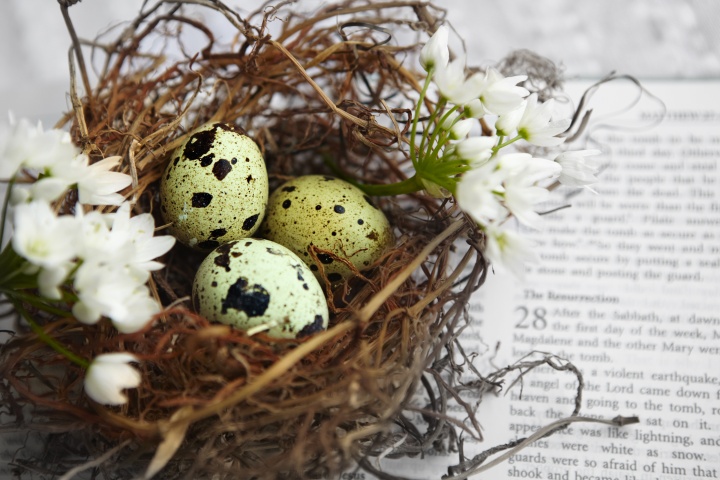For “Scripture Sunday”:
Origin of Easter
“Where did Easter and its customs come from? The Bible doesn’t mention rabbits or eggs or sunrise services. So what is the origin of Easter?

What is the origin of Easter?
Since Easter is one of the most renowned holidays in the Christian world, why should we be concerned about the origin of Easter?
For centuries, questions have arisen as to the relationship between bunnies and painted eggs and the resurrection of Jesus Christ. The truth of the matter is that Easter has its roots in ancient paganism and polytheism.
The origin of Easter
According to William E. Vine, “The term ‘Easter’ is not of Christian origin. It is another form of Astarte, one of the titles of the Chaldean goddess, the queen of heaven. The festival of Pasch [Passover] held by Christians in post-apostolic times was a continuation of the Jewish feast. … From this Pasch the pagan festival of ‘Easter’ was quite distinct and was introduced into the apostate Western religion, as part of the attempt to adapt pagan festivals to Christianity” (Vine’s Complete Expository Dictionary of Old and New Testament Words, 1997, “Easter”).
Another source states: “The history of Easter reveals ancient pagan roots; this holiday was not always a Christian-based holiday. It is believed that the term Easter is literally derived from the term Eostre, the name of a Teutonic feminine deity. The latter goddess is a fertility goddess, a goddess of the spring, and the hare is sacred to her. …
“The association of Easter practices with the pagan goddess Eostre makes clear some of the traditions that are carried out today. The goddess Eostre was honored toward the end of the month of March, right around the time of Spring Equinox” (HistoryofEaster.net).
Another source describes a possible ancient link to Good Friday: “In ancient Roman history, the 24th of March (VIII Kal Apriles) was the Dies sanguinis ‘day of blood,’ possibly a precursor of Good Friday. On the 22 of March, the arbor intrat, a procession of palms or a pine tree was brought to the shrine of Cybele. Two days later, at the Day of the Blood, the priests of Cybele slashed themselves and spun around to sprinkle her statue with blood” (AncientHistory.About.com).
The following is from another source: “Rabbits, of course, are a potent symbol of fertility due to their prodigious output of young. Eggs, likewise, have always been considered representative of new life, fertility, and reincarnation. Painted eggs, thought to imitate the bright sunlight and gaily colored flowers of spring, have been used in rituals since the days of the ancient Egyptians and Babylonians. …
“The pagan celebrations most associated with modern Christian practices derive from Mediterranean cultures. The Phrygians celebrated a spring festival honoring Cybele, a fertility goddess. Cybele had a consort god named Attis, who was born of a virgin, and who died and was resurrected after three days, an occurrence commemorated sometime around the vernal equinox. Worshippers of Attis mourned the god’s death on Black Friday, then celebrated his rebirth on the following Sunday.
“Attis was simply the latest manifestation of earlier resurrection myths like those of Osiris, Orpheus, Tammuz and Dionysus, who were likewise said to have been born of virgins and resurrected three days after their deaths. In areas where Christian beliefs later took hold, these already existing tales were grafted onto the story of Jesus Christ, and continue to be retold to this day.”
There are hundreds of other websites that discuss the pagan origin of Easter.
Should Christians celebrate Easter?
So, what is a Christian to do with the knowledge of the pagan origin of Easter? According to the Bible, God does not want His people to follow or seek after pagan customs.
When ancient Israel entered the Promised Land, God warned them not to seek after the teachings and traditions of the nations that once inhabited the land. He said, “Take heed to yourself that you are not ensnared to follow them, after they are destroyed from before you, and that you do not inquire after their gods, saying, ‘How did these nations serve their gods? I also will do likewise.’ You shall not worship the LORD your God in that way; for every abomination to the LORD which He hates they have done to their gods” (Deuteronomy 12:30-32).
Later, Christ told His disciples: “Well did Isaiah prophesy of you hypocrites, as it is written: ‘This people honors Me with their lips, but their heart is far from Me. And in vain they worship Me, teaching as doctrines the commandments of men.’ For laying aside the commandment of God, you hold the tradition of men” (Mark 7:6-8).
Therefore, anything that has pagan origins must be avoided by Christ’s disciples, no matter what the intent or long-standing tradition.
What the Bible tells us to celebrate
It is also important to note that the Bible nowhere tells us to honor the day of Christ’s resurrection. Instead, God established a command that the Passover should be observed annually to honor Christ’s death. Today, Christians are not to participate in the Easter holiday, but rather in the New Testament Passover, which is the memorial of Jesus Christ’s sacrifice for our sins.
In great solemnity, once a year on the 14th day of the first month on the Hebrew calendar (Leviticus 23:4-5), we are to observe the Lord’s Passover. On that special evening, the apostle Paul instructed the members of the Church to partake of the bread, which symbolizes Christ’s body broken (beaten) for us, and to drink of the wine, which symbolizes the New Covenant in His blood (1 Corinthians 11:23-29).
As to Christ’s resurrection, this occurred exactly three days and three nights after His burial (Matthew 12:39-40; Luke 24:46-47). Christ was crucified on a Wednesday afternoon, buried just before sunset, as Thursday was an annual holy day. He was resurrected three days later on Saturday afternoon (the weekly Sabbath) just before sunset. It must also be noted that on the first day of the week, Mary Magdalene had come to the tomb while it was still dark. Christ had already risen—long before sunrise (John 20:1-2).
So, the story of Christ’s resurrection occurring on Easter Sunday morning (as well as rabbits laying eggs) is a polytheistic myth. Instead of observing Easter or any of its customs, Christians are instructed to observe the biblically authorized holy days of God.”
From: https://lifehopeandtruth.com/life/plan-of-salvation/holy-days-vs-holidays/origin-of-easter/
You can learn more in the section “Holy Days vs. Holidays.”
________
What Easter Doesn't Tell You
Something critical is missing in the story of Easter and it has everything to do with your salvation. Learn more.
Video: https://youtu.be/w7ogXe71iZk
Or go to: https://www.ucg.org/beyond-today/beyond-today-television-program/what-easter-doesnt-tell-you
Transcript:
“[Darris] Could it be the Easter traditions leave something missing in the story of Jesus Christ? You may celebrate Easter customs to remember the resurrection of Jesus. But, there are Christians who believe in Jesus Christ as their Savior, without observing the Easter traditions. I happen to be one of them. Could it be that Easter does not tell you the whole story about Christ’s life, death and resurrection?
If there is something missing - and there is - then it changes the entire story about Jesus Christ. What’s missing and what you need to know is our topic . Join us as we discuss “What Easter Doesn’t Tell You.”
[Darris] Did you know that Easter as a celebration has nothing to do with Jesus Christ?”
More at: https://www.ucg.org/beyond-today/beyond-today-television-program/what-easter-doesnt-tell-you
________
Does Easter Really Commemorate Jesus Christ's Resurrection?
4 comments Estimated reading time: 16 minutes
“What do rabbits and eggs have to do with the death and resurrection of Jesus Christ? Where did the name Easter originate? This holiday isn't even mentioned in the Bible—so where did it really come from? Find out the surprising story behind this religious holiday.
 Lvnel/istock/Thinkstock
Lvnel/istock/Thinkstock
The world's observance of Easter is a curious mixture of ancient mythological and idolatrous practices and arbitrary dating that actually obscure and discredit the proof of Jesus Christ's messiahship and resurrection.
As a boy attending a mainstream church with my family, I was always surprised to see people at services on Easter Sunday who didn’t come any other time of the year, not even at Christmas. Embarrassed and somewhat fearful, a few of them told us they hoped that God would forgive their sins and absences because they made the special effort to come to church on Easter Sunday, which to them was the most sacred time of the year.
Customs and symbols associated today with Easter observance can be directly traced back to Easter’s pre-Christian origins.
Others felt that a special measure of sanctification, purification and holiness was imparted to them by their attendance at Easter services.
However, these people likely didn’t know or even wonder about Easter’s real origins. They probably would’ve been surprised to know the truth of the matter!”
More at: https://www.ucg.org/the-good-news/does-easter-really-commemorate-jesus-christs-resurrection
_________
Update.
Not a lot has been going on since I updated on Wednesday, which was the anniversary of Jesus’ sacrifice and the beginning of The Feast Of Unleavened Bread. On Thursday, a trip to the doctor’s office for the annual checkup required by my insurance company. It was done by a nurse practitioner, who when testing my strength, told me to push her. Then she said, “I should have known you’d be strong.”
For the last few mornings that we have worked, my helper and I have been re-doing the front door and glass storm door that Jay installed on the mini-house. They have never worked right. We had to reset the front door jamb completely and move it all inward, and the storm door had to be re-hung because it was ‘hinge-bound’.
For the church potluck I made another lamb dish with little new potatoes. Even though the pastor’s wife’s knee is better to the extent that she was finally able to come to church, she can still hardly walk. So I left early again as I knew that I would have to manage the kitchen. The pastor’s wife had made some taco meat from a church member’s home raised beef, and then there were all the fixin’s. I chopped up onions, lettuce, tomatoes and there was all that good stuff, like guacamole and shredded cheese. We had soft and crispy tortillas, still in keeping with The Feast of Unleavened Bread, as they are unleavened.
The Bible readings were Psa. 136, Lev. 6:8-8:36, Jer. 7:21-8:3 and 9:22,23, 1 Cor. 10:1-22. These scriptures include the ones about not grumbling, and don’t partake of the cup of the LORD and that of demons. The Teaching was about The Temple Of His Body, and The Resurrection. But neither the pastor’s wife, who was sitting in the kitchen, nor I couldn’t hear much of it as a lady came in the kitchen and was telling us all about her health, which I thought was very rude, and unimportant considering that the pastor’s wife and I were trying to listen to the Teaching. She would have had plenty of time to tell all that after the service. I pointedly went over to the speaker to try to show that I wanted to listen to the Teaching but she didn’t finally shut up until I said “They are saying the blessing”, which was at the end of the service.
We had a big crockpot of beef stew, my new batch of Lamb Cholent, Chicken and Enchiladas, and the hard and soft tacos. It was a great spread with no leavening at all, and enough to serve again on the last day of The Feast of Unleavened Bread which will be on Tuesday.
















No comments:
Post a Comment